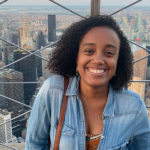



Instructors: Amanda Castleman, Jessica Poitevien and Leslie Hsu Oh
Dates: 2/11/25
Duration: six weeks
Price: $420, full scholarship available
You may also like: Travel Writing Master Class I
Enroll now!
The glamour of travel writing attracts many people. After all, who wouldn’t want subsidized trips to exotic destinations? But it’s not all easy living. Journalists must concoct ideas, sell them, plan the trip, research extensively in the field and then craft a gripping article. It’s work. Nice work, if you can get it, but a far cry from slobbing on the beach with a margarita.
The six-week course prepares you to enter this competitive and rapidly changing arena. Explore the different types of travel writing, including first-person memoirs, destination guides, historic reflections and news flashes for globe-trotting executives. Learn to devise appealing pitches and target the right editors. Discover the tricks of the trade, from filing taxes to building a journalism portfolio.
Other topics include narrative devices, research and interview techniques and — perhaps the greatest challenge — how to earn a living wage. The class also covers ethical considerations (for example, subsidized trips alienate publications like The New York Times and The Los Angeles Times).
You don’t need to be a world traveler to become a “writer about place.” Reveal the secrets of your hometown for visitors. Record an exceptional hike or festival. Share family holiday hassles and tips on how to avoid friction. The important thing is to learn how to capture a journey’s details and sensations – even the frustration of a flat tire – then spin them into perks, paychecks and published work.
This course takes you through the process step-by-step, with weekly lectures, discussions and feedback. Past students have spun this momentum into bylines at AARP, Bon Appétit, The BBC, CNN, Condé Nast Traveler, The Daily Beast, Hemispheres, Outside, Men’s Journal, National Geographic, The New York Times, Robb Report, Travel + Leisure and The Washington Post, among others.
One alumni landed three clips in national outlets — off her first pitches ever — halfway through the course. Several others have now won travel-writing’s most prestigious prize, the Lowell Thomas, or have been featured in Traveler’s Tales’ Best Travel Writing series. Whether you’re new to publishing or a seasoned writer, the class will help you find a new voice and inspiration.
Seattle-based lead instructor Amanda Castleman has lived abroad in Europe and the Middle East, and has taught travel writing online since 2003 — an unrivaled track record in the field. Here she works intensively with students’ prose, interleaving comments (developmental line-edits). She fine-tooth-combs the text, figuring out what’s naughty and what’s nice — and why. By the last lesson, you should have a polished draft ready for submission… and be on your way to making vacation a vocation.
Alumni describe Amanda as a “a dream teacher, just the right balance between a knuckle-rapping tutor and a mom full of hugs.” Her feedback has been celebrated as amazing, funny, insightful, confidence-boosting, and “exceptional in terms of quality, detail and sheer usefulness.” One student commented, “A fine-toothed-comb edit like this is hard to find. I can’t wait to get started revising: it’s like being told the cheat to a Sonic the Hedgehog game at school and rushing home to test it out!”
Co-teacher Jessica Poitevien has expatted in Spain and Columbia. She writes for outlets including Condé Nast Traveler, Daily Beast, People, National Geographic, and Travel + Leisure. Our third instructor, the fantastic Leslie Hsu Oh, has a degree in biology and ethnobotany, and an MFA in creative nonfiction and public health from Harvard. Her writing and photography appears in Alpinist, Backpacker, Conde Nast Traveler, National Geographic, Outside, Parents, Saveur, Smithsonian, Travel + Leisure, Vogue, Washington Post, and elsewhere. Best American Essays has honored her work, along with all the major US travel writing competitions.
But awards and publications are just icing on the cake: wherever you start from, this online workshop will help you kick things up a few notches.
Travel Writing I has deadlines, but no fixed time you must be online. We can offer extensions because of travel or national holidays: please chat with your instructors ahead of time to arrange this!
- Lectures — Wednesdays (written, read at your convenience)
- Assignments — due by midnight on Mondays wherever you are
- Critiques — post Thursdays by midnight Pacific
- Peer feedback: due by midnight on Thursday
- Special projects, like bios at the start — Saturdays
Note: This team also anchors the Travel Writing Master Class series. Need help deciding which is best for you? Check out this analysis — and feel free to email us with any questions at info@writelikeahoneybadger.com!
TRAVEL WRITING I CURRICULUM
Please note: the class has written lectures, feedback, and chat forums. There is no fixed time requirement to be on the classroom site.
Week 1: Bright ideas
What is travel writing? Controversy. Generating concepts. Angles. Write what you know. Supplementary reading: Types of travel articles and Understanding the genre’s big picture
Assignment: Travel brief (500 words or less)
Week 2: Trends and market research
Spotting trends. Press releases. Media kits. Press trip and tour traps. Online options. Research. Travel writing and literature. Guidebooks. Review brief.
Assignment: workshop your best idea, exploring the “why THIS story NOW by YOU” components and how your piece will build on previous coverage (max 600 words)
Week 3: Selling the goods
Researching your market. Keeping an eye on the competition. Writer’s guidelines. Writing succinct and successful queries. Approaching editors. Simultaneous submissions. Writing on speculation. Portfolios. Trappings of the trade. Snail mail vs. electronic pitching. Do you need a Web site? Review story ideas.
Assignment: Pitch letter (300 words or less)
Week 4: Story structure
Themes. Capsule sentence. Plot and narrative arc. A snappy start. Prioritizing information. Transitions. A strong finish. Sidebars. Review resources. Errors to avoid. Finishing touches. Fact-checking. Review pitch letter.
Assignment: First half of the rough draft (500 words max)
Week 5: Toning up
Target audience. Viewpoint. Colorful language and metaphor. AP style. Punchy headlines. Short, clear sentence structure. Avoiding word repetition. Revise concepts. Why redrafting matters. Writers to emulate. Review rough draft, part one.
Assignment: Second half of the rough draft (500 words max)
Week 6: Ethics, Etiquette and Resources
Subsidized trips. Freebie ethics. The middle road. The benefits of anonymity. Recycling material. Following up a pitch politely. Dealing with rejections. Courtesy in the face of frustration. Advertising pressure. Coping with rewrites. Rates. Syndication. Earning a living wage. Rights. Invoices. Tax and Accounting. Where to go from here: Conferences, organizations and books. Review second half of the rough draft
Assignment: Final draft (1,000 words or less)
Note: accommodations can be made around national or religious holidays, as well as major travel plans!
OPTIONAL READING FOR TRAVEL WRITING I
The course has no requirements — too difficult with such far-flung students — but the following books make great additions to any dedicated travel writer’s bookshelves.
- A Writer’s Coach by Jack Hart
- Writing for Story by Jon Franklin
- Writing Tools by Roy Peter Clark
- The Best American Travel Writing 2021 edited by Padma Lakshmi
- Telling True Stories edited by Mark Kramer and Wendy Call
.
SELECT WORKS BY AMANDA’S ALUMNI
- Best Travel Writing (gold in travel & sports): The Ringer by Jennifer William
- Bon Appétit: From Pandemic to Protests: How Food Businesses Nationwide are Responding by Sophia Gottfried
- Boston Globe: It’s Chopin’s 200th year, and Warsaw is Humming by Mary Ellen Monahan
- Christian Science Monitor: Magdalena Island’s Magellanic Penguins by Anne Clippinger
- Christian Science Monitor: Cats Among the Ruins by J Almon Polk
- Food Network Canada: Spotlight on Luang Prabang (Laos): A Hidden Foodie Gem by Mardi Michels
- The Guardian Weekly: Bhutan: a day of sunshine in the midst of the rainy season lifts spirits by Rachael Davey
- Insider: I gave my Afro-Latino boyfriend the ‘police talk’ before visiting the US. After George Floyd’s killing, I watched his baptism into American life by Jessica Poitevien
- Misadventures: Gorillas — and a Role Model — in the Mist by Lindsay Rohrbaugh
- The Medium: Little Snail Slowly Slowly Climb Mount Fuji by Aaron Paulson
- National Geographic Traveler: Miami Road Trip by Kelly Amabile
National Geographic: Celebrate Pride with 10 travel books by LGBTQ authors by Gillian Kendall
- National Parks Conservation Association: Forest Lights by Gina Vercesi
- The New York Times: Chic but Not Famous: A Resort Named José by Paola Singer
- San Francisco Chronicle: Spirit of Resistance Lives on in French Village by Debra Borchert
- Sierra Magazine: When Nature Calls in the Backcountry, It’s a Problem for Parks by Colleen Stinchcombe
- Spinoff: The Christchurch that could be: How the FESTA festival of urban renewal is creating magic out of disaster by Summer Hess
- The Vacation Gals, a site co-authored by alumna Kara Williams, which won the 2012 Lowell Thomas (travel-writing’s top prize) for blogging.
- Washington Post: Finding Gems in N.C. Ore, Not by Gaston Lacombe
- World Hum: Square Grouper on the Cocaine Coast by Jill K. Robinson, honored by the 2017 Lowell Thomas Awards for Strolling among Ghosts in Vietnam
- Yahoo News and Christian Science Monitor: Pandemic pulls Latin America’s trans community into the spotlight by Jennifer Bitterly
.
FREQUENTLY ASKED QUESTIONS
Where are the classes held?
We’ll be working on Google Classroom, a browser-based teaching platform. This allows files to be shared easily, without cluttering your inbox, and gives you classroom access from any net-wired terminal, anywhere in the world. But you’ll still have options to push alerts to email, if that appeals.
When does the bell ring?
Never! Go online whenever you please — the classroom is open 24/7.
Is there a video component or live chat?
No. The lectures, feedback and chat forums are all done in writing, so we can accommodate students traveling and living in many different time zones.
Is the course suitable for experienced writers?
Absolutely. Amanda’s taught full-time journalists and professionals jumping genres or reviving skill-sets (including former staffers for Shape, The Los Angeles Times and Wall Street Journal).
Can unpublished or emerging writers benefit from this workshop?
We can make that work. Wherever you are on the ladder, we can help you climb higher. But you may get more from the master class after an introductory course or time in the industry,
How much time does it take?
The time commitment varies, of course, but students seem to average 30-60 minutes for the lectures and at least 60-90 for the assignments. Ambitious readers can delve deep via links and articles: some study is self-guided and entirely optional.
What sort of success can I expect?
Students have published in outlets from Sunset to National Geographic Traveler and The New York Times. One had to pause, then restart the class later, because she landed so much work off the first pitches she ever sent. A handful have now won travel writing’s most prestigious prize, the Lowell Thomas, and been featured in Best Travel Writing.
But placement depends on timing, connections and marketing savvy, as much as talent. We work to boost each student up a few ladder rungs from where he or she began. For some, that’s publishing a first clip, for others breaking into A-list publications.
I live outside the U.S. Is this a problem?
The class is entirely online with no fixed hours. All you need is a word-processing program, Internet access, a browser and a credit card. A recent session included students from Ireland, Scotland, Prague, India and New Zealand, as well as across North America; such a mix really invigorates the class. Amanda has staffed in the US and UK – and continues to work for publications around the globe. Thus she’s sensitive to Anglophone dialects and how they might affect publication-ready prose.
Are the assignments flexible?
Yes. Amanda will line-edit alternative submissions that stick within the week’s word count. She’s also happy to give more general, holistic comments on larger pieces by arrangement. This allows students working on long-term projects to benefit from the lectures, peer feedback, the camaraderie of class and weekly instructor critiques at a “bulk discount” cost.
Will this course help a blogger?
Yes, if you’re eager to sell work to the mainstream media. You’re welcome to work on letters negotiating ads, sponsorships, ambassadorships or fundraising, but the course material won’t focus on these topics.
What stops other writers from stealing my ideas?
The world teems with story concepts and writers often stumble across the same ones: overlap tends to be coincidence, not theft. But this workshop will inoculate you, by focusing on the stories you’re most suited to tell, and digging deep for original angles, access and sources to make them shine. Between your unique take – and the 10,000-odd English-language publications worldwide – there’s room for students to explore the same topics, working together, rather than being at odds.
Will other students steal my contacts and outlets?
No. We encourage people to pool intel, as a rising tide lifts all boats. But you’re under no obligation to divulge publication details or editors’ emails, if that doesn’t feel comfortable.
What if I have another question?
Please ask us! Email amanda@writelikeahoneybadger.com. (Please note: we supply this address so we can assist students and alumni. We do not accept proposals to improve SEO or app/web-dev proposals. All off-topic emails will be reported as spam.)
